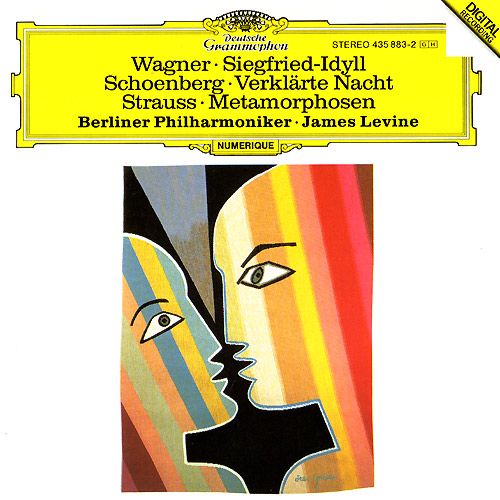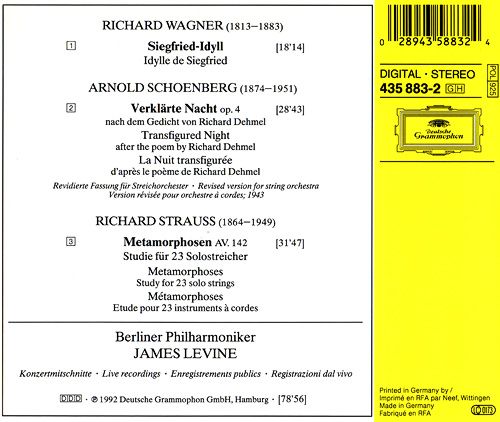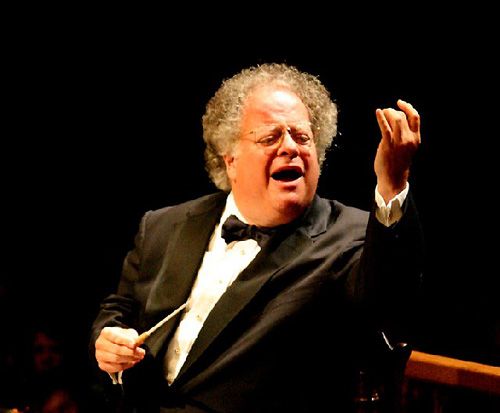wimpel69
06-17-2014, 08:45 PM
FLAC link (minus the artwork!) now openly available below. This is my rip.
Please add to my reputation if you download my material! Thank you.
Three radiantly beautiful and resplendent late-romantic German works for string orchestra in
intense and opulent versions with the Berlin Philharmonic under James "Don't
trust me with your little boys" Levine.
The full title on the original manuscript of Wagner's Siegfried Idyll reads, "Tribschen-Idyll,
with Fidi-Birdsong and Orange Sunrise, presented as a symphonic birthday greeting to his Cosima
by her Richard, 1870." The "Siegfried" in the title does not refer to the composer's opera of the
same name, as is often supposed, but to his infant son, whose pet name was "Fidi." The "orange
sunrise" refers to the color of Cosima's bedroom wallpaper, which brightly reflected the morning
light. Though the work is sometimes heard in an arrangement for full orchestra, Wagner originally
wrote it for an ensemble of 15 players. Having prepared and rehearsed the work in secret, Wagner
gathered his small orchestra on the stairway on Christmas morning, 1870, and awakened Cosima
with its first performance (Cosima's birthday was December 24; the Wagner family celebrated that
day and the Christmas holiday together). Afterward, Wagner and Cosima's five children presented
her with the score. Some neighbors of the Wagners were annoyed by all the noise and filed
a complaint with the local police.
Verkl�rte Nacht (or Transfigured Night), Op. 4, is a string sextet in one movement composed
by Arnold Schoenberg in 1899 and his earliest important work. Composed in just three weeks,
the work was inspired by Richard Dehmel's poem of the same name, along with Schoenberg's strong
feelings upon meeting Mathilde von Zemlinsky (the sister of his teacher Alexander von Zemlinsky),
whom he would later marry. The work comprises five sections which correspond to the structure of the
poem on which it is based, with themes in each section being direct musical metaphors for the
narrative and discourse found in the poem. As such, the piece is one of the earliest examples of
program music written for a chamber ensemble. The original score calls for two violins, two violas and
two cellos. In 1917, Schoenberg produced an arrangement for string orchestra (a common practice
at the time), and revised this version in 1943. There is also a version for piano trio by Eduard
Steuermann. The string orchestra version is the one most often recorded and performed .
Metamorphosen, Study for 23 Solo Strings, subtitled "In memoriam". It is widely believed that
Richard Strauss wrote the work as a statement of mourning for Germany's destruction during the
war, in particular as an elegy for devastating bombing of Munich, especially places such as the Munich
Opera House. This view, which began in the late 1940s, was supported and strengthened by a 1951 study,
although Strauss, who died in 1949, never said what the piece was about. A differing view was published
in the 1990s by Timothy L. Jackson who, after a careful analysis of sketch materials, concluded that
Metamorphosen was a philosophical, Goethean study of the underlying cause of war in general; the
cause being the bestial nature of humankind. Jackson's view is that in Metamorphosen Strauss used the
classical concept of metamorphosis as a process of transcending from the mundane into the divine, but
inverted it such that the outcome of metamorphosis is not an attainment of the divine but rather a
descent into bestiality.

[I]Music Composed by
Richard Wagner
Arnold Schoenberg
Richard Strauss
Played by the
Berliner Philharmoniker
Conducted by
James Levine
"In 1943 Schoenberg was in Hollywood, revising the orchestral version of his fin de si�cle tone-poem
Verkl�rte Nacht. At the same time, Strauss, contemplating the ruins of the city in which he had grown
up, sketched out a musical idea which he headed �Mourning for Munich�. The idea never came to fruition;
but two years later, faced with the destruction of Weimar and Dresden, Strauss used it as the basis of
his elegiac Metamorphosen � a piece that works its way inexorably towards its concluding quotation
from the Eroica Symphony�s funeral march. Wagner�s serene Siegfried Idyll makes an ideal foil to the
sombre atmosphere of the two works scored for strings only. James Levine takes a decidedly lingering
view of the opening pages of Metamorphosen; and it is a pity that he offers no increase in tempo for
the entry of the exultant horn theme in the Wagner. A distinguished disc, nevertheless, with the
Berlin strings on splendid form."
Misha Donat, BBC Music Magazine

Source: Deutsche Grammophon CD (my rip!)
Formats: FLAC(RAR), DDD Stereo
File Sizes: 363 MB
Download link (FLAC) - https://mega.nz/#!c0AxxAJI!ZP3u0EdJKxic6hAWdv2NpxM76kaLLaawdTJBF1xEPOw

You'll want "Jimmy" for renditions of big-boned late romantic works.
You don't want him as your baby-sitter. I.e. if the baby is a boy. ;)
Enjoy! Don't share! Buy the original! :)
And please add to my reputation if you download my material! ;)
Please add to my reputation if you download my material! Thank you.
Three radiantly beautiful and resplendent late-romantic German works for string orchestra in
intense and opulent versions with the Berlin Philharmonic under James "Don't
trust me with your little boys" Levine.
The full title on the original manuscript of Wagner's Siegfried Idyll reads, "Tribschen-Idyll,
with Fidi-Birdsong and Orange Sunrise, presented as a symphonic birthday greeting to his Cosima
by her Richard, 1870." The "Siegfried" in the title does not refer to the composer's opera of the
same name, as is often supposed, but to his infant son, whose pet name was "Fidi." The "orange
sunrise" refers to the color of Cosima's bedroom wallpaper, which brightly reflected the morning
light. Though the work is sometimes heard in an arrangement for full orchestra, Wagner originally
wrote it for an ensemble of 15 players. Having prepared and rehearsed the work in secret, Wagner
gathered his small orchestra on the stairway on Christmas morning, 1870, and awakened Cosima
with its first performance (Cosima's birthday was December 24; the Wagner family celebrated that
day and the Christmas holiday together). Afterward, Wagner and Cosima's five children presented
her with the score. Some neighbors of the Wagners were annoyed by all the noise and filed
a complaint with the local police.
Verkl�rte Nacht (or Transfigured Night), Op. 4, is a string sextet in one movement composed
by Arnold Schoenberg in 1899 and his earliest important work. Composed in just three weeks,
the work was inspired by Richard Dehmel's poem of the same name, along with Schoenberg's strong
feelings upon meeting Mathilde von Zemlinsky (the sister of his teacher Alexander von Zemlinsky),
whom he would later marry. The work comprises five sections which correspond to the structure of the
poem on which it is based, with themes in each section being direct musical metaphors for the
narrative and discourse found in the poem. As such, the piece is one of the earliest examples of
program music written for a chamber ensemble. The original score calls for two violins, two violas and
two cellos. In 1917, Schoenberg produced an arrangement for string orchestra (a common practice
at the time), and revised this version in 1943. There is also a version for piano trio by Eduard
Steuermann. The string orchestra version is the one most often recorded and performed .
Metamorphosen, Study for 23 Solo Strings, subtitled "In memoriam". It is widely believed that
Richard Strauss wrote the work as a statement of mourning for Germany's destruction during the
war, in particular as an elegy for devastating bombing of Munich, especially places such as the Munich
Opera House. This view, which began in the late 1940s, was supported and strengthened by a 1951 study,
although Strauss, who died in 1949, never said what the piece was about. A differing view was published
in the 1990s by Timothy L. Jackson who, after a careful analysis of sketch materials, concluded that
Metamorphosen was a philosophical, Goethean study of the underlying cause of war in general; the
cause being the bestial nature of humankind. Jackson's view is that in Metamorphosen Strauss used the
classical concept of metamorphosis as a process of transcending from the mundane into the divine, but
inverted it such that the outcome of metamorphosis is not an attainment of the divine but rather a
descent into bestiality.

[I]Music Composed by
Richard Wagner
Arnold Schoenberg
Richard Strauss
Played by the
Berliner Philharmoniker
Conducted by
James Levine
"In 1943 Schoenberg was in Hollywood, revising the orchestral version of his fin de si�cle tone-poem
Verkl�rte Nacht. At the same time, Strauss, contemplating the ruins of the city in which he had grown
up, sketched out a musical idea which he headed �Mourning for Munich�. The idea never came to fruition;
but two years later, faced with the destruction of Weimar and Dresden, Strauss used it as the basis of
his elegiac Metamorphosen � a piece that works its way inexorably towards its concluding quotation
from the Eroica Symphony�s funeral march. Wagner�s serene Siegfried Idyll makes an ideal foil to the
sombre atmosphere of the two works scored for strings only. James Levine takes a decidedly lingering
view of the opening pages of Metamorphosen; and it is a pity that he offers no increase in tempo for
the entry of the exultant horn theme in the Wagner. A distinguished disc, nevertheless, with the
Berlin strings on splendid form."
Misha Donat, BBC Music Magazine

Source: Deutsche Grammophon CD (my rip!)
Formats: FLAC(RAR), DDD Stereo
File Sizes: 363 MB
Download link (FLAC) - https://mega.nz/#!c0AxxAJI!ZP3u0EdJKxic6hAWdv2NpxM76kaLLaawdTJBF1xEPOw

You'll want "Jimmy" for renditions of big-boned late romantic works.
You don't want him as your baby-sitter. I.e. if the baby is a boy. ;)
Enjoy! Don't share! Buy the original! :)
And please add to my reputation if you download my material! ;)